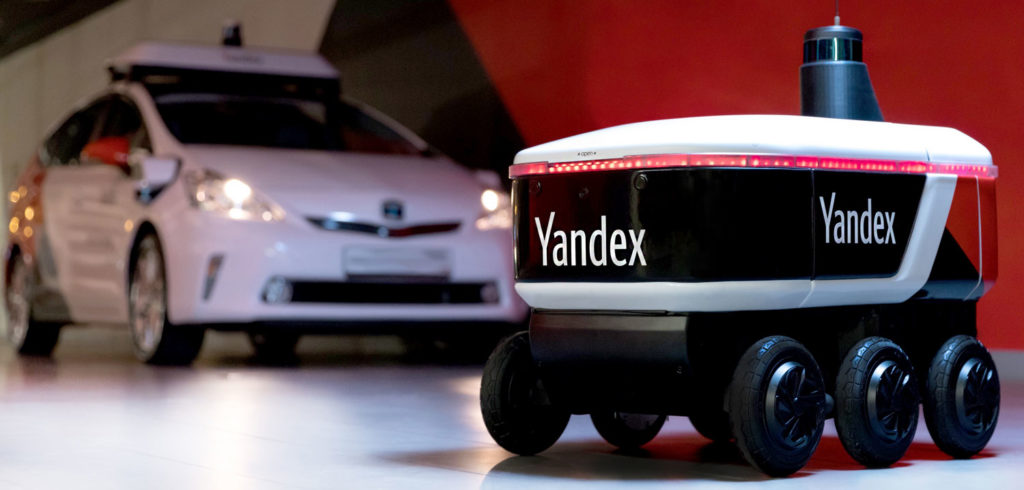Russian tech giant Yandex is delivering groceries to Moscow residents in just 15 minutes. How are they doing it? Ian Kerr, Postal Hub Podcast, and Marek Różyki, Last Mile Experts, provide analysis.
How fast is super-fast delivery? Russian tech giant Yandex is delivering groceries to Moscow residents in just 15 minutes.
Limited product range
The grocery service, called Yandex.Lavka, is structured around three key principles: a limited product range of 2,000 items, a dense network of mini-warehouses with a limited delivery zone, and a network of couriers.
“We saw that retailers themselves are too slow to deliver, while delivery startups that work with third-party stores don’t have real-time access to their assortment and often have to replace goods in the order,” Maxim Firsov, head of the division that includes Lavka, told Bloomberg. “Therefore, we focused on developing our own mini-warehouses with super-fast delivery.”
Orders are normally delivered by couriers on foot and sometimes by motorbike couriers. Importantly, deliveries are only made in the catchment area of each mini-warehouse. Delivery is free of charge for end customers but there is a minimum order value.
Not yet profitable
Like most other services of this kind, the super-fast grocery delivery service isn’t profitable, although Yandex hopes this will change as the service becomes more popular.
Competitors
Yandex’s competitors also offer superfast delivery. Food delivery service Lentochka offers delivery starting from 15 minutes in three Moscow districts. iGooods offers delivery within 25 minutes maximum, and SberMarket promises 30-minute delivery with no minimum purchase. Classic online shops like the market leader, Utkonos, offer traditional same-day or next-day delivery. Ozon, another e-commerce player, is only testing fast delivery from 40 minutes in some areas of Moscow.
It is quite early to expect a profit from this service. Yandex.Lavka is now fine-tuning its business processes and may be considered to still be at a pilot stage of development.
Tatyana Yampolskaya, Last Mile Experts pro-artner in Russia, comments that, “Given the fact that Yandex.Lavka is a part of the strong Yandex ecosystem, supported by heavy investments in infrastructure and technology, they have a real chance to evolve from the experimental phase to full-scale business model. But they need to be fast, in fact superfast, because it is all about timing in this space, right now”.
Autonomous delivery
Yandex has been active in developing autonomous vehicles, with a test fleet of about 100 passenger vehicles.
In November 2019 it unveiled its autonomous delivery robot for small-size cargos, called Yandex.Rover.
Yandex’s vision for the delivery robot includes delivering orders for restaurant delivery service Yandex.Eats, groceries for Yandex.Lavka, goods for online marketplace Beru, or operating across the company’s warehouses.
Our Comment
We are less optimistic than Yandex about the Lavka service being profitable. Fresh (grocery) delivery is even harder to make money on than an Uber Eats-type service for several reasons, including:
- customers being less willing to pay a reasonable fee than when they are waiting for their favourite takeaway;
- stock outs, where the customer can refuse a whole basket if one key ingredient is missing;
- customer refusals, if the item is not in line with their quality expectation etc.; and
- the need for dedicated localized stocks.
Amazon can make fresh work as part of a much wider and longer-term strategy…although we cannot imagine fresh being profitable as a standalone service.
If Yandex takes an ‘Amazon like’ approach, and sees superfast fresh delivery as part of a strategy to tie customers in, rather than a financially balanced goal in itself, this project may indeed move from a trial to a permanent offering.
Finally, and as per our earlier articles on this subject, we don’t believe that robots (or AGVs – autonomous guided vehicles) will be a credible alternative in dense urban areas like Moscow…at least for the foreseeable future.
 Ian Kerr is the founder and host of the Postal Hub Podcast, the weekly podcast for the postal and delivery sectors.
Ian Kerr is the founder and host of the Postal Hub Podcast, the weekly podcast for the postal and delivery sectors.

Marek Różycki is managing partner at Last Mile Experts, specializing in CEP and e-commerce last-mile advisory.


